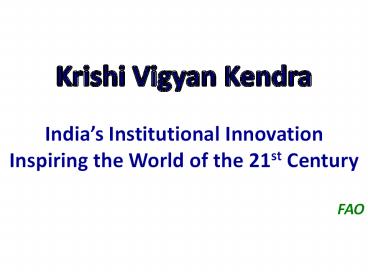Krishi Vigyan Kendra India - PowerPoint PPT Presentation
Title:
Krishi Vigyan Kendra India
Description:
KVKs are Unique ... No other agricultural system large or small -- in the world has front line decentralized research capacity at District Level KVKs are a ... – PowerPoint PPT presentation
Number of Views:7335
Avg rating:3.0/5.0
Title: Krishi Vigyan Kendra India
1
Krishi Vigyan KendraIndias Institutional
Innovation Inspiring the World of the 21st
Century FAO
2
KVKs are Unique...
- No other agricultural system large or small --
in the world has front line decentralized
research capacity at District Level - KVKs are a model for adaptive research to
diagnose and solve problems emerging from
District agro-ecosystems - KVKs are perfectly located to lead and incubate
local innovation
3
- KVKs are particularly vital in the 21st century,
as farmers face - Natural Resource constraints water, land,
biodiversity - Climate change drought, warming, extremes
- Increasing transboundary risks from trade and
traffic - Market demands and price volatility
4
KVKs Lead Local Innovation
- KVKs are best placed to draw in feedback from
District, Block, Village level institutions,
NGOs, PCs, and Farmers Federations, on
Location-Specific, Context-dependent problems - KVKs are best placed to diagnose field problems,
characterize field conditions, then apply
informed, evidence-based pressure on the NARS
SAUs, ICAR, State research centres, and the
entire network of fellow KVKs - KVKs will enable the entire NARS to become more
locally relevant, more USEFUL
5
KVK SYSTEM PLATFORM OF SCIENCE SOCIETY
6
Rewinding the process
- The Indian Council of Agricultural Research is an
apex body to co-ordinate, guide and manage
agricultural research, education and extension
in the country. - The ICAR has played a pioneering role in ushering
Green Revolution and subsequent developments in
Indian agriculture. - Based on the recommendation of the Education
Commission (1964-66), discussion by the Planning
Commission and the Inter-Ministerial Committee,
and further recommendation by the committee
headed by Dr. Mohan Sinha Mehta appointed by ICAR
in 1973, - The first Krishi Vigyan Kendra (KVK) was
established at Pondicherry in 1974 under the
administrative control of the Tamil Nadu
Agricultural University, Coimbatore.
7
Timeline Expansion
KVKs have grown as a large network in the country
with a quantum jump in number reaching to 630
during XI Five Year Plan and 634 at present.
8
Uniqueness
- Creation of valuable resources in terms of
manpower and assets - Confirmation of technologies to suit local
specificity - Showcasing the frontier technologies
- Capacity building among stakeholders
- Front runner in technological application,
information and inputs - Participatory approaches in planning,
implementing, executing evaluation
9
Technology assessment, refinement and
demonstration of technology /products
KVK aims at
The activities of KVK include
on-farm testing to identify the location
specificity of agricultural technologies under
various farming systems
frontline demonstrations to establish its
production potentials on the farmers fields,
training of farmers to update their knowledge and
skills in modern agricultural technologies
training of extension personnel to orient them in
the frontier areas of technology development
work as resource and knowledge centre of
agricultural technology for supporting
initiatives of public, private and voluntary
sector for improving the agricultural economy of
the district
In addition, in order to speed up the process of
dissemination of technology, a large number of
various extension activities and production of
seeds and planting materials are taken up by the
KVKs.























![Indira Gandhi Krishi Vishwavidyalaya - [IGAU], Raipur PowerPoint PPT Presentation](https://s3.amazonaws.com/images.powershow.com/9657385.th0.jpg?_=20210906100)







